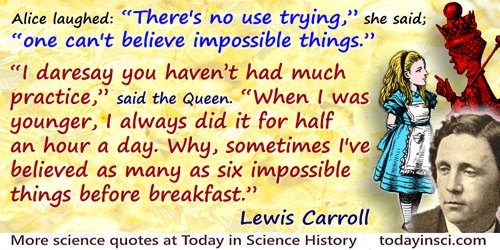Breakfast Quotes (10 quotes)
A carriage (steam) will set out from Washington in the morning, the passengers will breakfast at Baltimore, dine at Philadelphia, and sup in New York the same day.
(about 1804). As quoted in Henry Howe, 'Oliver Evans', Memoirs of the Most Eminent American Mechanics: (1840), 80.
A story about the Jack Spratts of medicine [was] told recently by Dr. Charles H. Best, co-discoverer of insulin. He had been invited to a conference of heart specialists in North America. On the eve of the meeting, out of respect for the fat-clogs-the-arteries theory, the delegates sat down to a special banquet served without fats. It was unpalatable but they all ate it as a duty. Next morning Best looked round the breakfast room and saw these same specialists—all in the 40-60 year old, coronary age group—happily tucking into eggs, bacon, buttered toast and coffee with cream.
'Objections To High-Fat Diets', Eat Fat And Grow Slim (1958), Ch. 3.
Alice laughed: “There’s no use trying,” she said; “one can’t believe impossible things.” “I daresay you haven’t had much practice,” said the Queen. “When I was younger, I always did it for half an hour a day. Why, sometimes I’ve believed as many as six impossible things before breakfast.”
In Through the Looking-glass: And what Alice Found There (1875), 100.
As we consider the manifold materials that keep us going between breakfast and bedtime, our welfare is served by the wild species that make up the planetary ecosystem with us. To date, scientists have conducted intensive screening of less than 1 percent of all species with a view to determining their economic potential. Yet these preliminary investigations have thrown up thousands of products of everyday use.
A Wealth Of Wild Species: Storehouse For Human Welfare (1983), Prologue, 8.
Hope is a good breakfast, but it is a bad supper.
'Apophthegms From the Resuscitatio' (1661). In Francis Bacon, James Spedding, The Works of Francis Bacon (1860), Vol. 13, 391.
If you ask your mother for one fried egg for breakfast and she gives you two fried eggs and you eat both of them, who is better in arithmetic, you or your mother?
From 'Arithmetic', Harvest Poems, 1910-1960 (1960), 116.
It is a good morning exercise for a research scientist to discard a pet hypothesis every day before breakfast. It keeps him young.
On Aggression, trans. M. Latzke (1966), 8.
Just as Americans have discovered the hidden energy costs in a multitude of products—in refrigerating a steak, for example, on its way to the butcher—they are about to discover the hidden water costs. Beginning with the water that irrigated the corn that was fed to the steer, the steak may have accounted for 3,500 gallons. The water that goes into a 1,000-pound steer would float a destroyer. It takes 14,935 gallons of water to grow a bushel of wheat, 60,000 gallons to produce a ton of steel, 120 gallons to put a single egg on the breakfast table.
From 'The Browning of America: Drought, Waste and Pollution Threaten a Water Shortage', Newsweek (23 Feb 1981), 26-30. In long excerpt in William Shurtleff and Akiko Aoyagi, History of Soymilk and Other Non-Dairy Milks (1226-2013) (2013), 1126-1127.
On the morning of 1 November 1956 the US physicist John Bardeen dropped the frying-pan of eggs that he was cooking for breakfast, scattering its contents on the kitchen floor. He had just heard that he had won the Nobel Prize for Physics along with William Shockley and Walter Brattain for their invention of the transistor. That evening Bardeen was startled again, this time by a parade of his colleagues from the University of Illinois marching to the door of his home bearing champagne and singing “For He’s a Jolly Good Fellow”.
In Abstract for 'John Bardeen: An Extraordinary Physicist', Physics World (2008), 21, No. 4, 22.
The breakfast slimes, angel food cake, doughnuts and coffee, white bread and gravy cannot build an enduring nation.

 In science it often happens that scientists say, 'You know that's a really good argument; my position is mistaken,' and then they would actually change their minds and you never hear that old view from them again. They really do it. It doesn't happen as often as it should, because scientists are human and change is sometimes painful. But it happens every day. I cannot recall the last time something like that happened in politics or religion.
(1987) --
In science it often happens that scientists say, 'You know that's a really good argument; my position is mistaken,' and then they would actually change their minds and you never hear that old view from them again. They really do it. It doesn't happen as often as it should, because scientists are human and change is sometimes painful. But it happens every day. I cannot recall the last time something like that happened in politics or religion.
(1987) -- 


